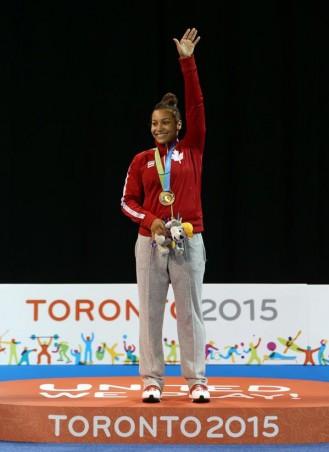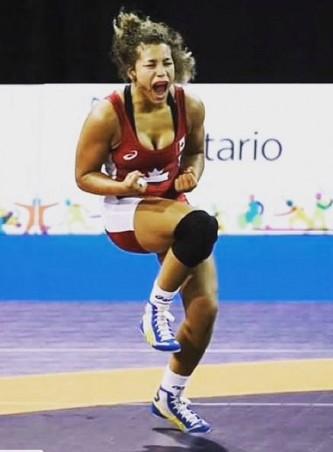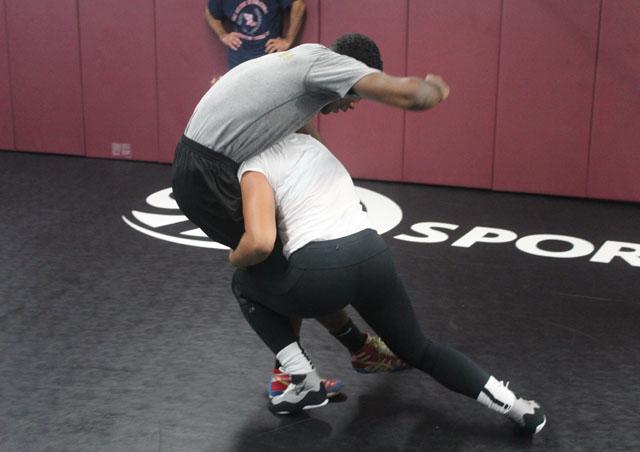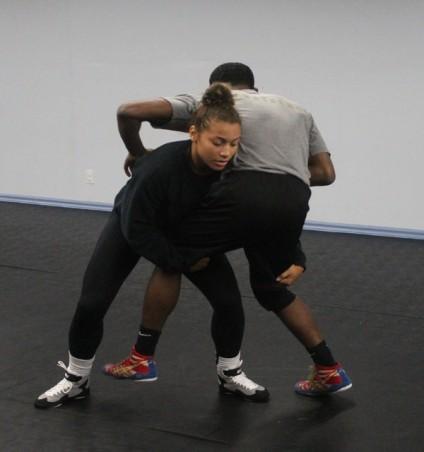

How a Ryerson student seized gold at Pan Am and surprised no one
On the mat at the Mississauga Sports Centre, Braxton Stone-Papadopoulos of Pickering, Ont. is 30 seconds away from winning gold at the 2015 Toronto Pan Am Games in 63-kilogram freestyle wrestling.

Braxton Stone-Papadopoulos with her gold medal. PHOTO COURTESY SAEED AZERBAYJANI
The 20-year-old leads her opponent, Katerina Vidiaux of Cuba, by a score of 4-3 and the pro-Canadian crowd is screaming as they watch their hometown favourite perform.
The clock is ticking. Vidiaux is desperate to score and Stone-Papadopoulos knows this. After quickly side-stepping a duck-under attempt from Vidiaux, Stone-Papadopoulos blocks another grab and turns to the offensive. She spins Vidiaux around and pushes her towards the edge of the ring, then pounces onto her opponent’s back and pins her to the floor, scoring another point and taking a 5-3 lead.
With 15 seconds to go, Vidiaux can still tie the match and she is aggressively trying to do so. She’s the defending Pan Am champion in the 72-kilogram division and has fought in the Olympics. Those accomplishments are just dreams to the young Stone-Papadopoulos, who is competing in her first Pan Am Games.
But the Canadian is determined to win. As Vidiaux slides down to her knees in an attempt for one final leg grab, Stone-Papadopoulos widens her stance, grabs her opponent’s neck and circles around her before pouncing on her back. Another two points.
The whistle blows and her face is in her hands. She pumps both fists in the air 10 times, a smile beaming from her face. The two wrestlers are brought to the centre of the mat and the referee lifts Stone-Papadopoulos’s hand, declaring her the winner. She hugs Vidiaux, shakes the Cuban coach’s hand, then grabs a Canadian flag from her own coach, Saeed Azerbayjani. With the beaming smile still plastered across her face, Stone-Papadopoulos runs a circle around the mat, flag waving wildly behind her — now able to call herself a Pan Am champion.
“It’s so amazing! I’m so excited!” she tells the CBC after the match. And after learning about her journey leading up to this moment, it’s clear why she says excited and not surprised.
F rom an early age Braxton Stone-Papadopoulos has been a star athlete. She earned a black belt in taekwondo before the age of 10, while competing in track and soccer.
Her father Kirk Papadopoulos, a Toronto police officer, was the one who introduced her to taekwondo — which he helped coach. When Braxton was 10, Kirk was asked by his cousin, Olympic wrestling coach Stan Tzogas, if Braxton would like to try his sport.
“I heard she was really good in [taekwondo] and so I said, ‘Why don’t you give this a try, it’s almost the same,’” Tzogas says.
Braxton remembers her first practice as being a little rough, to say the least.
“I remember my parents are standing on the sidelines, and they’re like, ‘Good job.’ And I was running and crying because I was like, ‘Take me home,’” she recalls. “Literally every single practice for two years was like that.”

PHOTO COURTESY SAEED AZERBAYJANI
Kirk remembers the crying too, but says that Braxton was probably just uncomfortable in the new situation. Coming from her success at taekwondo to lying flat on her stomach constantly in wrestling was probably frustrating for her, he says.
“She cried when she played soccer at first,” Kirk says. “I think it was just a new experience and at her age, I took the crying as something new. Braxton likes to be comfortable.”
Braxton says the first time she knew she would be more than just good at wrestling was when she was in Grade 7 and entered an open tournament against girls in high school. In the semifinals of the tournament, Braxton took on the girl who everyone considered the one to beat — and beat her.
“Even though that was in the semifinal and I ended up losing in the final, that semifinal was a really good match,” she says. “So that was like the TSN Turning Point, I guess.”
At the same time, she had to make a decision between wrestling and taekwondo. She sat down with her parents and coaches from both sports to discuss the pros and cons of staying in one or the other. Eventually, she decided on wrestling.
Braxton says she doesn’t really know why she chose wrestling, but she’s glad she did. “Nobody ever thought I was going to be good at wrestling when I first started,” she says.
With that decision out of the way, Braxton began training full time with Tzogas’s Team Impact Wrestling club. Her father began taking her to a personal trainer and working with her outside of wrestling practice to become a better athlete, improving her speed and endurance for long matches and tournaments.
Wrestling became Braxton’s life. If her wrestling coaches wanted her to practice three times a week, she and Kirk would sneak back into the gym a fourth time. She continued to run on the track and build her endurance up with push-ups, sit-ups and squats after every practice. Kirk says he invested a lot of time and money into his daughter’s development, doing whatever it took to see her succeed.
Kirk recalls one time when he took Braxton to a physiotherapist after an injury. At the end of the session, the physiotherapist asked if he could schedule them for another session the following week. Kirk replied, “If she was Sidney Crosby, would she be back tomorrow? I want you to treat Braxton like she’s Sidney Crosby, I’ll see you tomorrow.” And they were back the next day.
She wanted to do the extra [work] and she wanted to be the best.
“I saw what was happening,” he says. “She wanted to do the extra [work] and she wanted to be the best.”
Before every tournament, Braxton finds her dad in the stands and gives him her gold cross chain to wear. Both of them use it as a way to stay connected with God and each other during the grind that comes with tournaments.
“When I give it to my dad it’s a whole comfort thing for me,” she says. “I know that God will be with me and my dad is with me, and that whatever happens, I know that I’m still going to be loved and still blessed.”
“No matter where I am, she’ll track me down,” Kirk says. “It’s a proud moment for me. You’re never too big for that.”
I n late August, Braxton is back in the gym, practicing with other high-profile Team Impact members. The organized wrestling group known for producing top athletes holds its practices in a converted pool behind the Adult Learning Centre on the Danforth. Mats forming two rings are rolled out onto the floor and nine wrestlers take turns battling in one-minute matches.
Today, Braxton is partnered with Dillon Williams, 19, who like Braxton is starting to find international success in the sport. Both have been back for a week from the junior world championships in Brazil, where Williams finished 18th in the men’s 60-kilogram category and Braxton won the bronze in the women’s 63-kilogram.

Photo Josh Beneteau
As Williams and Braxton roll around on the mat, coach Azerbayjani and uncle/coach Tzogas watch them, offering pointers through demonstrations, using one of the two as a sort of crash dummy to prove a point.
“Make sure if you’re going to attack, get close to the legs and then attack,” Azerbayjani tells them as he grabs Williams's legs and pushes him onto his back.
This is followed by the two alternately dropping to their knees, sliding towards their opponent, wrapping both arms tightly around a leg then pushing up and slamming them to their backs.
“Nice speed Brax. Push on your toes too,” Azerbayjani says.
This isn’t the first time Braxton has been partnered with a guy. In fact, Tzogas estimates that 80-90 per cent of her practice matchups since Grade 7 have been boys.
“It was difficult sometimes,” Kirk says. “Braxton would have to wrestle with the guys because the girls who were older didn’t want to wrestle [her].”
Braxton says fighting the boys has helped her more than hurt her development.
More girls are comfortable sitting back, while I just want to get in there and get it over with.
“[Girls] like to tie up and stay close, whereas I — because I’ve worked with a lot of the boys — just like to go out there, hook hands and just stay on the attack,” she says. “More girls are comfortable sitting back, while I just want to get in there and get it over with.”
Williams doesn’t mind it either. He says Braxton’s tough to beat and that he learns a lot from her.
“She’s got really good position so she really makes me work,” Williams says. “She’s really sharp, she’s very technical and and I think that’s what she really catches a lot of people on.”
W hile Braxton takes a breather between matches with Williams, Mia, the six-year-old daughter of former world champion Miyu Yamamoto, grabs a towel and dabs her head. Braxton grabs Mia and tickles her, smiles and says thanks. Once Braxton is back on the mat, Mia is right on the edge, cheering her on.
“Let’s go Braxton, let’s go!” she repeats over and over again.
“I love kids,” Braxton says.
That is why next year she hopes to enrol in Ryerson’s child and youth care program. With the commitments required to perform at this level, school takes a back seat. But she has been taking night classes through the Chang School to keep her mind sharp until she begins classes full time.
“I think she would be really good at that,” Kirk says. “It’s up to Braxton what she wants to do and I’ll support her anyway.”

Photo Josh Beneteau
What Braxton really wants to do is go to the Olympics next year in Rio de Janeiro. And her chances of going are actually really good, despite being only 20 years old.
As the current Canadian national champion — a title she claimed at both the junior and senior level in March — Braxton is the top-seeded wrestler at the Canadian Olympic trials this December. A group of wrestlers will battle in a tournament, with the winner then taking on the third place from nationals, the second place from nationals and then Braxton in a best of three final. The ultimate winner of this tournament will represent Canada at the Olympics.
Despite being the top seed, Braxton is staying level headed. She says that wrestling is a sport where anything can happen and the moment an athlete forgets that is when they begin to lose.
“You never know, you could be a world champion and then two weeks later you could go to a tournament and possibly not even make the podium,” she says. “It’s that type of sport where you never know what’s going to happen.”
While Braxton doesn’t know what’s ahead, her father is convinced that she will be going to Brazil next summer.
“I’m not saying this because she’s my daughter, I’m saying this because of her abilities,” Kirk says. “I don’t think anyone can beat Braxton.”